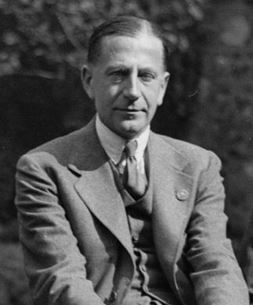
The National Centre Party, initially known as the National Farmers and Ratepayers League, was a short-lived political party in the Irish Free State. It was founded on 15 September 1932 in the Mansion House, Dublin, with the support of several sitting TDs, including the three Farmers' Party members and thirteen Independents, all of whom feared for their political future if they did not coordinate in a common organisation. Prominent among the latter were party leader Frank MacDermot, a TD for Roscommon since the general election of February 1932, and James Dillon, a TD for Donegal, who was the son of John Dillon, the last leader of the Irish Parliamentary Party.
The Scots National League (SNL) was a political organisation which campaigned for Scottish independence in the 1920s. It amalgamated with other Scottish nationalist bodies in 1928 to form the National Party of Scotland.
The London Swinton Circle is a long-running British right-wing pressure group. The group states that its purpose is to uphold traditional conservative and Unionist principles.
The National Democratic and Labour Party, usually abbreviated to National Democratic Party (NDP), was a short-lived political party in the United Kingdom.
The Communist League of Great Britain was an anti-revisionist group in the United Kingdom.
The Irish Workers' Group (IWG) was a Marxist political party in Ireland. It originated as the Irish Workers Union, which later called itself the Irish Communist Group, and contained a variety of people who all considered themselves to be Marxists. Some were from an Irish Republican background, and some, including Gerry Lawless, also became involved in Saor Éire.

The Commonwealth Land Party was a Stoke based political party in the United Kingdom. It was founded in 1919 by J. W. Graham Peace and R. L. Outhwaite as the Commonwealth League, and was initially associated with the Independent Labour Party. It campaigned for the redistribution of land and the abolition of all taxation other than land rent.
The National Assembly Against Racism (NAAR) was a British anti-racist and anti-fascist group.
The National Progressive Democrats was a small socialist political party in the Republic of Ireland, active between 1958 and 1963. The party was founded as a left-wing progressive secular party. Its founders were Noël Browne and Jack McQuillan, former members of the social democratic wing of Clann na Poblachta.
The Indian Empire Society was a London-based lobbying organization, formed in 1930 to promote the cause of the British Empire in India.
Muintir na hÉireann was a minor political party in Ireland, with socially conservative and populist policies. It was founded in 1994 and active in the 1990s. The party had one public representative, former Green Party councillor Richard Greene, who served one term on Dún Laoghaire–Rathdown County Council from 1991 to 1999. Greene left the Green Party in protest at its "left-wing social agenda", particularly its refusal to adopt a pro-life policy on abortion, and his party reflected his views on issues such as family values and the extradition of republican POWs to the United Kingdom.
The National Peace Council (NPC), founded in 1908 and disbanded in 2000, acted as the co-ordinating body for almost 200 groups across Britain, with a membership ranging from small village peace groups to national trade unions and local authorities. The groups were all united in their interest in peace, human rights, justice and the environment.
Land&Liberty is a quarterly magazine of popular political economics: its focus is the relationship between land and natural resource rights and 21st century economic policy. Published in the UK it covers international affairs and events from a global perspective.
The Irish Monetary Reform Association was a minor Irish political party of the 1940s. It was little more than an electoral vehicle for Oliver J. Flanagan, the long-serving TD for the constituency of Laois–Offaly. As such, it is difficult to draw conclusions about the party independent from those about Flanagan himself. Monetary Reform can be seen as the most successful of a wave of minor far right parties in 1940s Ireland, like Ailtirí na hAiséirighe. Flanagan played on certain themes of the Social Credit movement, which accentuated his image as an anti-Semitic politician.
The Business and Professional Group was a minor political party in the Irish Free State that existed between 1922 and 1923. It largely comprised ex-Unionist businessmen and professionals.
The English League for the Taxation of Land Values was a Georgist political group. It was a historic precursor of two present-day reform bodies: the international umbrella organisation the IU and the UK think tank the Henry George Foundation. The object of the League was
the taxation for national and local purposes of the 'unimproved value of the land', ie the value of the land apart from the buildings or other improvements in or upon it. The League actively support[ed] all proposals in Parliament for separate valuation of land, and for making land values the basis of national and local taxation.
The British League of Ex-Servicemen and Women (BLESMAW) was a British ex-service organisation that became associated with far right politics during and after the Second World War.
The Victoria League for Commonwealth Friendship (1901–present) is a voluntary charitable organisation that connects people from Commonwealth countries. There are currently branches in the UK, Australia, and New Zealand with affiliated organisations in Canada and the USA. It is headquartered in Bayswater, London, United Kingdom.
The Militant Christian Patriots (MCP) were a short-lived but influential anti-Semitic organisation active in the United Kingdom immediately prior to the Second World War. It played a central role in the ultimately unsuccessful attempts to keep the UK out of any European war.


